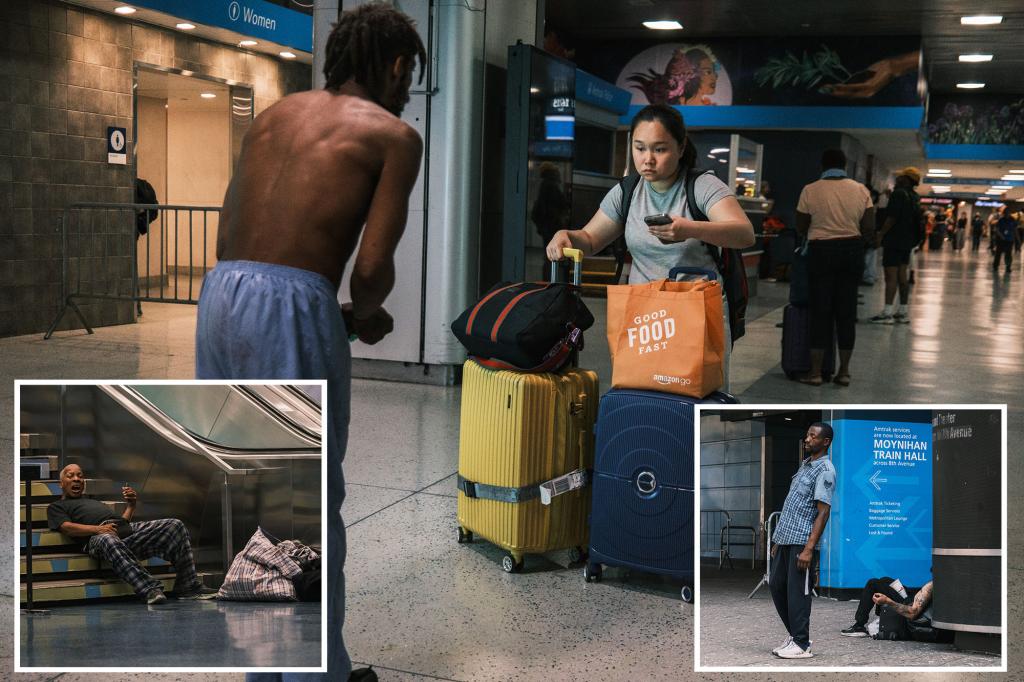When Carlton Moore says New York City’s homeless shelters aren’t “peaches and cream,” he speaks from a lifetime of experience.
Moore, 61, who wears a colostomy bag and takes daily medication for his schizophrenia and bipolar disorder, has lived on the streets in every borough since he was a teenager — and knows that inside homeless shelters, he’ll have to sleep with one eye open.
Rather than risk life and limb in homeless shelters, Moore and many like-minded homeless have chosen to live on streets near Penn Station – where tourists, everyday New Yorkers and, especially, an army of aid workers provide food, water, gift cards and cash.
“The services are here, the help is here,” he told The Post from the transit hub last week. “If I need something, I can get it, and I’m protected.
“The homeless at Penn like the situation they’re in.”
Nathaniel Armstrong, a 57-year-old homeless man, likewise treats Penn Station as a home base because of officials’ hands-off, perk-filled approach.
“If you’re homeless and you need some place to go, you go to Penn and you know BRC — one of the homeless organizations that comes to help in the evening — is going to be there to help.”
Moore and Armstrong are part of a growing cohort of destitute New Yorkers who’ve exited the “revolving door” of the city’s hellish homeless shelter system in favor of a relative life of leisure on the streets near Penn Station.
But the invasion of shelter-refusing homeless, many of whom are mentally ill, has brought increasing squalor, open drug use and the lingering threat of random violence to Penn Station — one of several Midtown tourist and commuter hotspots where city officials either turn a blind eye to chaos or are helpless to confront it.
‘Scariest part of my day’
Penn Station itself has long had a nightmarish reputation, at least for commuters and tourists.
Gov. Kathy Hochul once described the transit hub as a “hellhole” — an apt description for the claustrophobic, confusing and decaying eyesore.
And homeless New Yorkers are part of its crumbling landscape, said Sam Adam, a manager at a delicatessen, bar and pizzeria in the station.
He said the throngs of homeless panhandlers used to clear out during the summer, before swarming “like ‘The Walking Dead’” in the cold winter months.
But recently, he’s seeing more who are outright crazed, roaming around yelling and screaming.
“We’ve been here since 1985 and it’s always been a problem but it’s gotten a little worse in the past year — more people who are cuckoo, not just homeless panhandling,” he said.
“They have outreach workers who come around offering them shelter, but they don’t want to go, they’d prefer to be here. The homeless don’t want to go to the shelters.”
In just one eye-opening instance over two weeks of reporting, a Post reporter watched for nearly 90 minutes as a mentally ill man roamed Penn Station, flailing his arms and shouting incoherently, without any MTA outreach workers, Amtrak cops or Madison Square Garden security lifting a finger to help.
As the deranged man passed out between bouts of mania, commuter Sharon Savino, 68, tried to alert security to him.
“The scariest part of my day is coming in and out of Penn Station,” said Savino, adding she now carries Mace to protect herself.
“I used to feel funny making a wide berth around anyone who looked mentally ill, because I would seem prejudiced, but now I don’t care because enough crimes have happened. They need to get these people off the streets and figure out where they’re going to house and care for these people.”
Later that day, The Post spotted the unhinged man post-slumber try to snatch cash from a tip jar at Auntie Anne’s Pretzels inside the station, before he disappeared down the stairs into the subway.
‘They don’t feel safe’
Penn Station’s epidemic of troublesome homeless has prompted city-funded outreach that The Post saw firsthand often fall short on the ground, and have been criticized by some top officials as mismanaged.
Many outreach workers won’t even do their jobs without NYPD backup, a law enforcement source told The Post.
“They ask the cops to go out with them because they don’t feel safe approaching the people,” the source said. “The cops just stand in the background. They don’t interact with the people.”
The city last year inked a $103 million contract for homeless outreach on the subways with the Bowery Residents’ Committee, despite the nonprofit coming under fire from watchdogs for essentially doing nothing, Gothamist firstreported.
The group provided, “at best, minimal outreach services — often turning away those apparently seeking assistance and, at worst, seemingly ignoring homeless persons seeking assistance,” a 2019 MTA watchdog report found.
A BRC employee told The Post that they cover Penn Station, Grand Central Station and the subways, mostly to get the homeless into “low threshold” Safe Haven shelters that offer no curfew and more privacy as an alternative to city-run shelters.
Just 2% of all 99,000 outreach attempts citywide during 2022 led to a person checking into Safe Haven, according to a city comptroller report last year.
And the number of homeless people who sleep on the streets and subways hit 4,140 in January, the highest in the annual federally mandated unsheltered population count in at least a decade.
Amtrak Police also patrol Penn Station, but officers who spoke to The Post said there’s little they can do about homeless people unless they break rules.
They said they accompany outreach workers who offer shelter but estimated it is rejected 75% of the time.
A Post reporter followed “Amtrak Homeless Outreach” workers with clipboards and orange vests, who walked past five homeless people on the floor of Penn Station without stopping to talk.
‘Good all day’
The track to Penn Station for Moore came after a five-month stay at a Days Inn shelter in Brooklyn.
He liked his time at that shelter, where he had a private room. But when he was told he’d soon be transferred to Wards Island, a dorm-style shelter with a reputation for violence, he decided to leave altogether.
“I would rather be on the streets than on Wards Island,” he said.
Inside homeless shelters there’ll be neighbors — perhaps even himself during a medical episode — “scratching bugs out” from their skin or scheming to steal his few possessions, Moore said.
“The shelters are worse than the 70s and 80s. The shelters are getting worse.”
Armstrong also said he’ll never go back to a shelter for fear of theft and violence.
“The shelters are not much better than prison,” he said. “I’ve been to prison, where danger looms 24/7, and it’s the same in the shelters.
He also likes the freedom being at Penn Station offers.
“If you go to a shelter or you go to prison the security will say ‘do this, go here, get away from there’, but at Penn they’ll ask you to keep moving then smile and walk away,” Armstrong said.
“They have to keep the area attractive but as long as you follow the rules nobody’s going to harass you,” he added. “It’s safe for the homeless here because if you stay in the areas they allow you to go, they consider you a traveler and the security extends to the homeless as well.”
Others, like ex-con Shaun Doherty, 47, are drawn by cold hard cash.
Doherty said he can make $50 to $100 panhandling in the busy commuter hub during the day, before he turns to sleep on the subway by night.
“With 50 bucks I can get cigarettes, a coffee, three meals and a pair of socks,” he said. “You’re good all day.”
Doherty spoke to The Post in the Penn Station’s unrenovated corridor between Jersey Transit and LIRR, where he was perched on a suitcase holding out a clear plastic Dunkin Donuts cup for cash.
He said doesn’t trust shelters because they’re run by the same government that locked him up — he wouldn’t say what for.
“This is a main train station so there’s a lot of people. Where there’s a lot of people, there’s a lot of money,” he said. “You can go to Port Authority, but it’s not as nice. This is like a mall.”
‘A ton of work to do’
Mayor Eric Adams, when asked Tuesday about the situation at Penn Station, acknowledged problems in the area.
He argued that the city needs to take stronger actions such as involuntarily committing mentally ill homeless people — a controversial effort that he pushed over the objections of many advocates.
“We were bold enough to do that,” he said. “We’re still pushing forward. Keep trying new initiatives to find that sweet spot.”
The city as a whole needs to do more on the closely connected crises of mental health and homelessness, said Council Member Linda Lee, who chairs the committee on mental health, disabilities and addictions.
“For years, disinvestment into our mental health infrastructure has led to a workforce shortage and a lack of retention of skilled mental health professionals, improper housing for those in need of care and support, and a criminalization of mental illness resulting in an inappropriate intersection with our criminal justice system,” she said in a statement.
“This has created a perfect storm of the ‘revolving door’ that we see in our communities where mentally ill New Yorkers are admitted into treatment, and discharged, only to find themselves on the streets again.”
Even with the daily horrors, the area near Penn Station has improved, said Brian McGinn, a retired NYPD deputy chief who’s now vice president of security and operations for the 34th Street Partnership.
He said both the partnership and landlord Vornado Realty have bolstered security and green spaces such as Plaza 33 have been cleaned up and “beautified.”
“It’s gotten a lot better, but there’s still a ton of work to do,” McGinn said.
A network of methadone clinics and other substance abuse programs along the Eighth Avenue “strip of despair” – which were highlighted recently in The Post – that serve as a magnet for addicts, vagrants and the mentally ill are to blame for the problems, McGinn contended.
Overall felony crime in the NYPD’s Midtown South Precinct covering Penn Station – in addition to Times Square, Grand Central Station and Madison Square Garden – has been trending downward, according to police crime statistics.
But murder, rape and felony assault have all ticked up so far this year compared to the same span in 2023, the data shows.
Deputy Mayor Anne Williams-Isom contended Tuesday that the city’s work on street homeless, including a suite of multi-agency teams, has connected more than 7,600 people to shelter.
“I don’t think that we have been unsuccessful,” she said. “I think post-pandemic, we know that there were a lot more people who have been on the streets. We know that there are a lot more people who need support, and I think we’re doing a great job.”
— Additional reporting by Carl Campanile and Larry Celona




